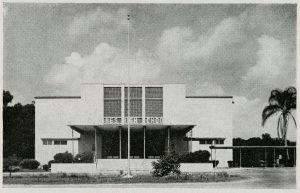
“I believe our students learn in three years what it took me 20 to learn,” says Stephen Schlow, interim chairman of the UCF film department, “which is that the amount of money you have is in fact a tool, not a barrier. It’s just another thing you work with to make your film.”
UCF’s M.F.A. track in entrepreneurial digital cinema insists young filmmakers concentrate more on the process and less on their budget. Film costs are considered a restraint that must be lived with, not a problem that must be solved. At UCF, students are required to complete a feature-length digital film on a budget of $50,000 or less.
“The goal in this process is for someone to come out on the other side with an understanding of the relationship between story, film and budget,” Schlow says. “We’re all about allowing them to make the films they want to make without being held accountable to investors or distributors.”
Shooting a feature film with a small budget also provides students with lessons in business, one of the goals of the program. With a limited budget and limited resources, the artist is forced to be innovative and flexible, adapting when things don’t go as planned. “I once got caught in a sandstorm in Egypt and lost two days of shooting,” Schlow recalls. “When something unplanned happens, and inevitably it does,” Schlow says, “students have to find another way to get the shot or tell that part of the story.”
Andrew Gay, an M.F.A. graduate and current instructor in the program, also took away important lessons in how budget constraints can translate into artistic opportunities. While shooting scenes for his thesis film, “A Beautiful Belly,” he found creative ways to make the most of every dollar, including shooting some critical scenes with live dolphins at the Clearwater Marine Aquarium, who allowed him to shoot there for free. Gay says, “The dolphin footage we shot was more beautiful than I ever could have imagined, and it adds like a million bucks of production value to our movie and cost us basically nothing.”
The other important parameter of the program is that students must make their films in an entirely digital format. As with the limited budget, the goal is not to treat the medium as an obstacle, but to encourage students to make movies that take advantage of it.
Read the full article at Pegasus: The Magazine of the University of Central Florida.